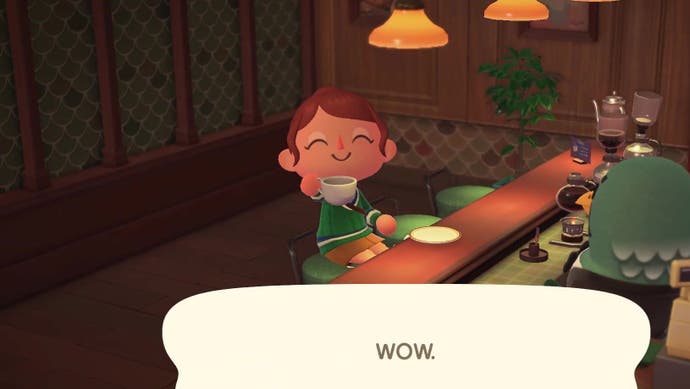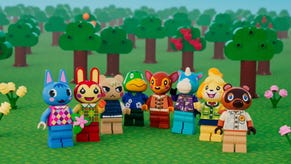Animal Crossing: The polite battleground for gaming's soul
I'm breaking up with my Nook Phone.
There's a screen in the Switch interface that tells me I've played Animal Crossing: New Horizons for almost 200 hours. That feels by far the longest I've ever spent with a single game - though perhaps Fortnite might tell me otherwise. The weird thing is, with New Horizons, it really doesn't feel like I've spent 200 hours with it. Maybe the time has flown by. Maybe. It's more that my interactions with the game feel, even now, relentlessly superficial.
Animal Crossing is a lovely game about moving to a town filled with animals and then swapping furniture with them. That's the basics of it, I guess. New Horizons shifts this to an island setting, but it's the same deal. And yet within this simple set-up - almost a doll's house really - it can feel like a huge battle is taking place. A battle at the heart of video games. A battle between earning and being. Gosh, that sounded pretentious. Apologies. (For more on this distinction please see Edwin's infinitely more thoughtful piece on the subject.)
But seriously. My purest memories of Animal Crossing probably go back to the GameCube. That first game, bought on import, played via a disk you had to put in first that allowed you to play import games, was a marvel. My friend and I didn't know what we were getting into. Then, as any Animal Crossing player will recognise, we started to worry that the ground was dropping away forever. This tiny game that could be played straight from GameCube's memory it was so snug, seemed to contain horrifying depths. The furniture went on forever. Wingback chairs all the way to the bottom.
Even then there were two Animal Crossings. The let's go for a walk and see what happens Animal Crossing, and the God, I need one more armchair to complete the set Animal Crossing. The first Animal Crossing was infinitely the better game. Those first moments were magic. I have written about this before but the first time you plant a fruit in Animal Crossing, the first time you clock in at night and it's night in the game, warm light glowing in every house you pass - these moments are properly priceless. You cannot put a value on them. The first time I met Wisp! The first time I saw fireworks reflected in the pond.
But they were surrounded by things you could put a price on. Collecting furniture sets. Getting the house and the wardrobe just so. Making your villagers as happy as they could be, arranging - always a bit creepy this - for the cast of villagers you most wanted. This game is not very good, I would argue. (Good in the way of the Lévi-Strauss formula for good food: good to eat, good to think.) But it is compelling. My feeling back in the day was that Animal Crossing was testing you. I always felt it was asking me to reject this second game and find the beauty in the first. Yes, you can spend your afternoon with the Argos catalogue (RIP), but wouldn't you rather go outside?
Maybe I was correct about that. But by the time we get to New Horizons - I forget how many sequels in we are now - the second game has really grown, while it feels like the first game has ever slightly withered. A tiny example of the withering. In the first game, your post-person was a stork, and you might catch them in the act of delivering mail. A tiny thing but it sold the fantasy: this is a real place, these animals are real and have jobs and all that jazz. I have asked around a bit, but nobody I know has seen a stork post-person in New Horizons. Post, it seems, is just another system now.
But it is far from alone. So much to collect. So much to sound out. So many galleries to fill - I'll admit, I love filling them! - so many ways to change the world and make it the way you want it.
And the phone. Surely the phone is the point where New Horizons becomes satire? You can track your progress - how many trees cut, how much fruit collected, how much this, how much that - on an in-game phone. Those little buzzes you get when you unlock something new! It's satisfying by itself and it often translates directly to currency so you can go on feeding the system, but now the village you escape to, the place you might flee your workaday life to spend time in, really does look a lot like the life you are leaving behind.
Games, I've often worried, do not always trust us very much. They don't trust us to enjoy them without buzzers going off and pop-ins erupting and points going up. This is not an original thought, I appreciate. But it's illustrated quite beautifully by Animal Crossing. It still feels like a test: will you go for a walk, or will you try and finish that art gallery? Can you do both? Can you keep them in balance?
The art gallery! I worried for a long time whether I would keep playing once the gallery was finished. It has been, you know, a compulsion. But then Brewster turned up and I felt the first game - the better game - was making its presence known again. Here is an entirely pointless act, surely: give an imaginary pigeon 200 imaginary bells so that you can drink an imaginary cup of coffee. The pleasure of drinking pretend coffee! The first, better, game incarnate.
And yet yesterday I went into the Roost, sat down, had my coffee. And then once it was done, my phone buzzed.











